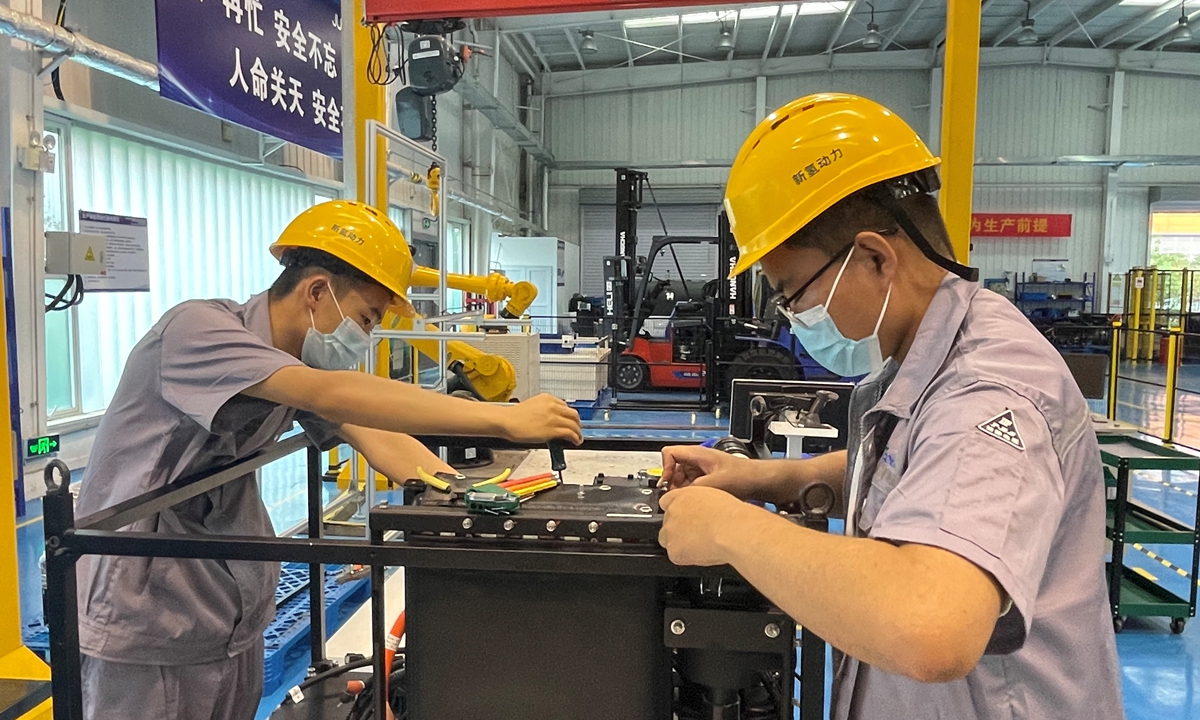
Photo: Cui Fandi/GT
It has been more than three months since China released its medium- and long-term plan for the development of the hydrogen energy industry (2021-2035), and some companies in the industry have turned to the application of hydrogen energy in industrial production and handling.
Observers point out that such shift is expected to significantly boost the development of hydrogen power companies and possibly facilitate a breakthrough in the development of the industry, overcoming the strong reliance on government subsidies.
With a rich source and low carbon emission, hydrogen energy has always been seen as an important carrier for transportation, industry and other energy-using terminals to realize decarbonization. It is also widely regarded as a strategic emerging industry and a key development direction for the future.
"China's hydrogen energy industry is still at its early stage of development, and it is necessary to strengthen the top-level design, systematically plan and to promote the high-quality development of China's hydrogen energy industry as a whole," Wang Xiang, deputy director of the Department of High Technology of the National Development and Reform Commission, said in March.
At present, 99 percent of hydrogen power companies in the market choose commercial vehicles such as buses and heavy trucks, Chen Haitao, who has been deeply involved in the field of hydrogen power for many years, told the Global Times.
The selling price of hydrogen-powered buses and heavy trucks usually exceeds 1 million, which makes it difficult to promote and companies have to rely excessively on subsidies to survive, industry observers said, pointing out that the construction of large hydrogen refueling stations on highways or within cities is also a major problem that is currently difficult to solve, which directly leads to mileage anxiety that is difficult to alleviate, said Chen, who is also the founder of an industry-leading company in hydrogen power, Tianjin JustPower Technology Co., Ltd.
Relatively speaking, hydrogen power application in industrial vehicles is not a topic that has often been raised in the Chinese industry in the past.
However, data shows that there is a huge market for industrial vehicles in China, both in terms of stock and potential. In the case of forklifts, for example, more than 800,000 new forklifts will be added in China in 2020 and 1.03 million in 2021. In the past two years, the new scale of forklift market in China alone will reach 200 to 300 billion yuan ($29.6 to 44.4 billion). In addition, the number of forklifts per 10,000 people in China is less than half of that in developed countries, so there is huge room for growth in later stages.
At the same time, according to industry insiders, the application of hydrogen power to industrial vehicles such as forklifts can best avoid common problems that exist in the application of hydrogen power to buses and heavy trucks such as high cost and mileage anxiety.
"If hydrogen power is applied to industrial vehicles, although the cost a single hydrogen-powered forklift is still higher than that of traditional energy-powered forklifts, the lifetime cost of using hydrogen forklifts is lower than that of traditional energy forklifts and electric forklifts, based on a comprehensive calculation of factors such as depreciation rate and replacement rate," hydrogen power expert Wang Wenqing told the Global Times.
Since industrial vehicles such as forklifts usually only operate within a certain range of areas, mileage anxiety is drastically reduced. At the same time, building your own small hydrogen refueling station is a proven option.
In Tianjin Lingang Economic Zone Intelligent Equipment Industrial Park, the Global Times reporter witnessed the example where hydrogen energy is used in industrial vehicles. Self-built hydrogen refueling facilities within the scope of the operation sites are used for the resupply of hydrogen energy. "This solves the problem of the construction difficulties and hydrogen refueling station replenishment," said Wang.
Compared with the battery function, hydrogen energy power has its unique advantages. One of the most obvious is that it only takes 2-3 minutes to refill a hydrogen fuel cell forklift, while a battery forklift takes at least an hour to recharge and has to be filled with water and replaced.
In China, some innovative companies have already invested in the production of hydrogen fuel cell forklifts, and their safety and stability have been proven.
In October 2021, Sinopec Yanshan Petrochemical Company received 37 hydrogen fuel cell forklifts developed and manufactured by JustPower, a company dedicated to hydrogen power for industrial vehicles, replacing the original internal combustion engine forklifts in the chemical storage area.
According to the data provided by Yanshan Petrochemical, as of June this year, the average working hours of a single hydrogen forklift exceeded 2,700 hours and achieved a CO2 emission reduction of about 27 tons.
"Especially in December, when Beijing suffered a low temperature of minus 19 degrees, all the hydrogen forklifts put into use maintained their continuous working capacity without fail." A manager of Yanshan Petrochemical said.
JustPower released three more novel products in April - 5 ton AGV hydrogen fuel cell truck, solid state hydrogen storage fuel cell forklift, and 3 ton AGV hydrogen fuel cell forklift, all of which are the first industrial vehicles in the area of hydrogen energy application in China.
The Medium- and Long-term Plan for the Development of Hydrogen Energy Industry (2021-2035) was released, which proposes to "build a diversified hydrogen energy application ecology covering transportation, energy storage, industry and other fields."
The Hydrogen Energy Industry and Policy Research Group of Renmin University of China believes that hydrogen is currently most used in industrial fields such as chemical industry, petroleum refining and metallurgy. However, with the continuous improvement of fuel cell related technology, fuel cell related industries are starting to scale up.




